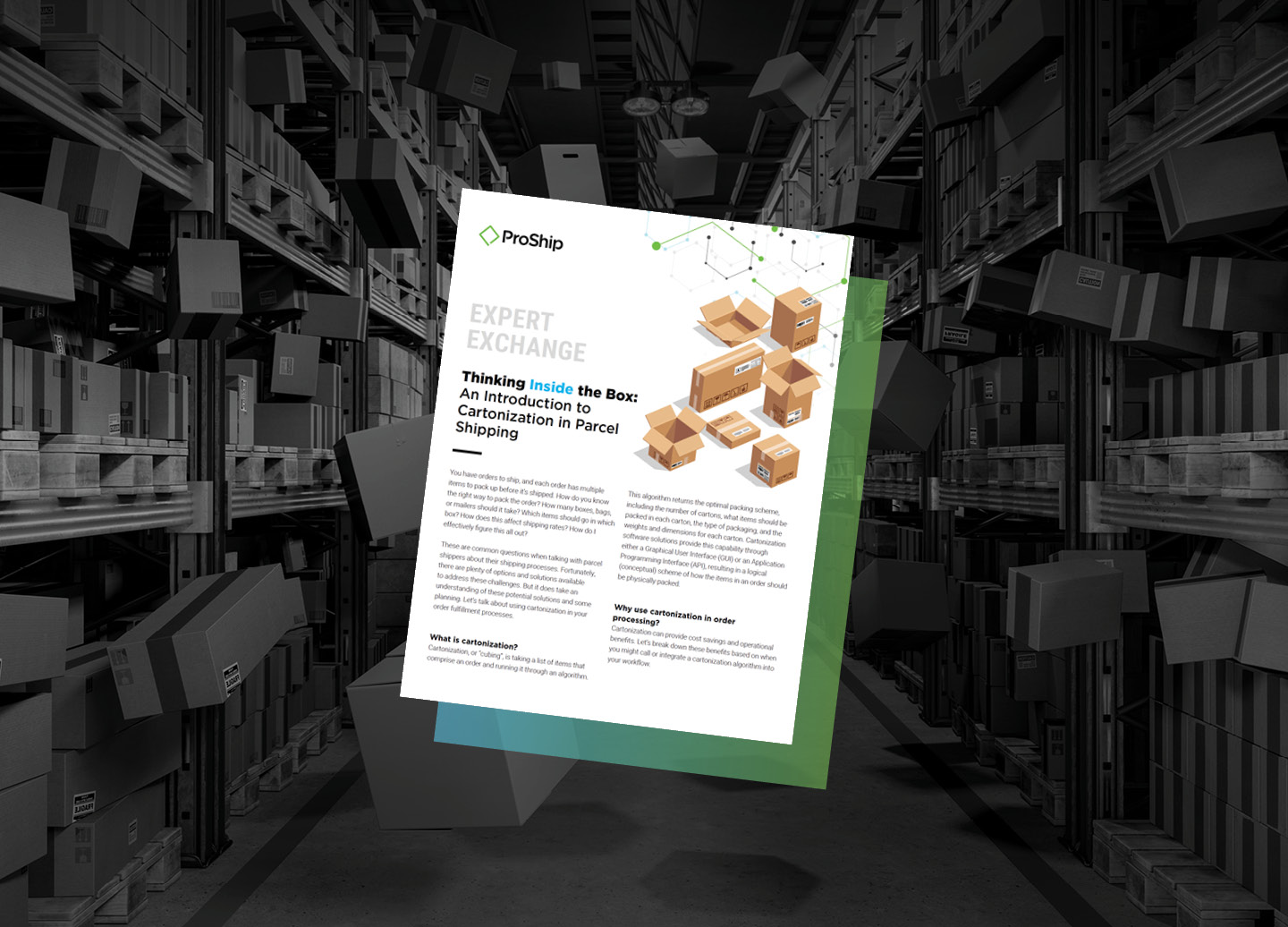Explore the challenges healthcare organizations face and how supply chain technology can help overcome them
Healthcare organizations: your supply chain is a complex obstacle course. Complex products and orders, intricate regulations, and diverse clients, all while keeping your costs in check can feel nearly impossible. Delays mean headaches, not just for you, but for your customers.
But what if there was a way to bridge this gap and supercharge your supply chain into success? That’s where strategic supply chain technology comes in – a powerful tool that can optimize routing, slash shipping costs, and guarantee on-time deliveries every step of the way.
This isn’t just about efficiency, it’s about a competitive edge. With the right shipping technology, you can not only maintain a positive customer experience (CX), but also gain a strategic advantage in a demanding market. So, let’s explore how you can leverage technology to conquer your supply chain challenges and improve the critical path to an improved customer experience.
Navigating Supply Chain Challenges in the Healthcare Industry
Before we dive into why healthcare organizations need multi-carrier shipping software, let’s take a closer look at the unique challenges this sector faces. Healthcare entities grapple with financial constraints and operational complexities that are often heightened by the sensitive nature of their supply chains.
Diverse Healthcare Organizations and Their Supply Chain Needs
We can group the diverse landscape of healthcare organizations into four main groups based on their common characteristics and supply chain needs, with each sub-sector presenting distinct challenges.
Healthcare Facilities
For hospitals and clinics, their supply chains are a lifeline. They juggle a constant flow of pharmaceuticals, equipment, and supplies, with each delay potentially impacting the customer experience [Learn more about top-notch healthcare customer experiences]. Beyond speed, they grapple with meticulous inventory management, ensuring essential items are readily available. Compliance with intricate storage and handling regulations adds another layer of complexity to their supply chain management.
Healthcare Manufacturers and Suppliers
Healthcare manufacturers and suppliers operate in a highly regulated world. Every step, from production to packaging and distribution, is managed by strict protocols and must be documented. Navigating evolving regulations and potential recalls demands agility and attention to detail. Additionally, ensuring secure and sometimes temperature-controlled shipping for sensitive products like pharmaceuticals is critical for their success.
Healthcare Distributors and Logistics Providers
Healthcare distributors and logistics providers coordinate diverse stakeholders, transportation modes, and a constant stream of crucial supplies. Their challenge lies in streamlining operations, offering visibility across the logistics network, and encouraging seamless collaboration between partners. Preventing shortages and maintaining temperature-sensitive goods are just two parts of their complex logistical problem.
Specialized Healthcare Services
Healthcare extends beyond hospitals, encompassing diverse settings like home care, mobile clinics, government-driven initiatives, and even remote surgery teams. These providers require adaptable and flexible supply chains to cater to unique patient needs and environments. From delivering vital equipment to rural areas to adhering to privacy regulations, they must tailor their shipping programs to fit the dynamic nature of their work. Complex scheduling and detailed delivery coordination add another layer of challenge to their operations.
Operational Intricacies that Healthcare Organizations Face
Beyond tight budgets, healthcare organizations face operational hurdles that impact efficiency and cost control. These include:
- Inventory Organization: Managing diverse medical supplies, equipment, and pharmaceuticals with fluctuating demand and strict expiration dates is a constant logistical puzzle. Outdated inventory leads to wasted resources, while out of stock items can delay critical care.
- Shipping Delays and Disruptions: Unpredictable transportation networks and unexpected bottlenecks can cause costly delays, impacting the customer experience and disrupting schedules. A dependency on single carriers offers limited flexibility in the face of these challenges.
- High Shipping Costs: Traditional shipping methods often result in inflated costs due to the specialized nature of healthcare shipments, not to mention the limited visibility into rates and carrier options. The lack of automation in manual processes further adds to inefficiencies and unnecessary costs.
- Technology Disconnect: Relying on outdated shipping solutions creates disjointed information systems and hinders integration with other parts of the Enterprise Software Stack (ESS). This disconnect restricts the ability to gain real-time insights, optimize routes, and make data-driven decisions.
- Manual Errors and Inefficiencies: Manual processes in tasks like label generation and creating documentation are prone to errors and slow down operations. This translates to wasted time, increased costs, and potential compliance risks.
These operational points of friction significantly impact healthcare budgets and the customer experience, or in this case – patient care. Fortunately, there are powerful supply chain technologies available to address these challenges, streamlining operations, optimizing costs, and ultimately contributing to a better customer experience.
The Need for Strategic Supply Chain Technology
Healthcare isn’t simple. It’s a complex and diverse group of organizations – each facing unique logistical challenges. Tight budgets, operational hurdles, and strict regulations intertwine, impacting every step from procurement to delivery. It’s clear that in healthcare, every minute matters. That’s where strategic supply chain technology steps in, offering a powerful tool to navigate these complexities and ensure efficient, cost-effective healthcare logistics.
Traditional shipping methods just don’t cut it. Delays in medical supplies can have more serious consequences. Manual processes and a reliance on single carriers can drain resources. This is where multi-carrier shipping software rises to the challenge, transforming the complexity into something organized and efficient.
Why Multi-Carrier Shipping Software?
Think of a multi-carrier shipping solution as a powerful, comprehensive, and essential tool for your supply chain:
- Slash Costs: Compare rates across multiple carriers to find the lowest cost and fastest delivery – up to 30% savings compared to traditional methods. In addition, multi-carrier shipping solutions can typically offer access to specialized healthcare carriers to keep costs in check. Free up budget for what matters most. [Discover how fast multi-carrier shipping software shows an ROI in healthcare shipping.]
- Simplify Compliance: Seamless integration with your systems ensures that you meet strict FDA validated regulations and can be confident of compliance with thorough documentation, avoiding regulatory headaches.
- Stay Agile: Navigate disruptions and changes with ease. Reroute shipments, mitigate delays, and keep critical supplies moving.
- Boost Efficiency: Automate manual tasks like label generation and documentation. Reduce errors, speed up workflows, and free up your team to focus on other priorities.
Multi-carrier shipping software isn’t just a technological upgrade – it’s a strategic advantage. It empowers you to take control of your supply chain, optimize costs, and ultimately deliver an exceptional customer experience.
ProShip Multi-Carrier Shipping Software: Your Trusted Partner
ProShip strives to be not just your shipping software, but a partner for healthcare organizations. We understand your unique challenges and offer a shipping solution that is specifically tailored to your needs:
- Automate with Confidence: Define customer-specific business rules with FDA validation and secure GIT version control. No more hand-coding or errors.
- Rate Shopping Rules: Find the fastest, cheapest routes for every package with ProShip’s industry-leading rate-shopping engine. Save time and money.
- Delivery Deadlines Met: Guarantee on-time deliveries with Advanced Date Shopping using 9 data points. Fulfill delivery promises with confidence.
- Hazmat Made Easy: Forget compliance headaches. ProShip’s Labelmaster Add-on handles labeling, packaging, and documentation automatically. Stay safe and focused.
- Expand Your Network: Onboard new carriers easily with ProShip. Avoid surcharges, manage capacity restrictions, and unlock more shipping options – even healthcare specific, like UPS Premier.
ProShip’s robust and automated multi-carrier shipping solution helps healthcare companies around the world take control of their supply chain, optimize costs, and deliver exceptional customer experiences. Learn more about how ProShip serves the healthcare industry or schedule a discovery call to see if ProShip’s advanced solution is a fit for your needs.


 Back to Blog
Back to Blog





